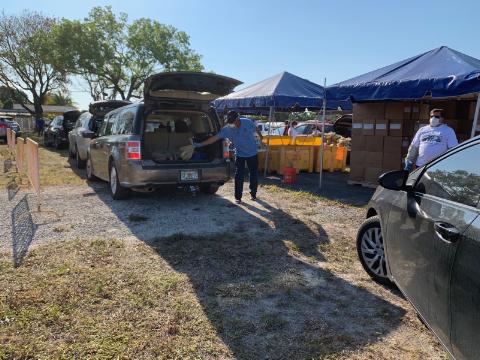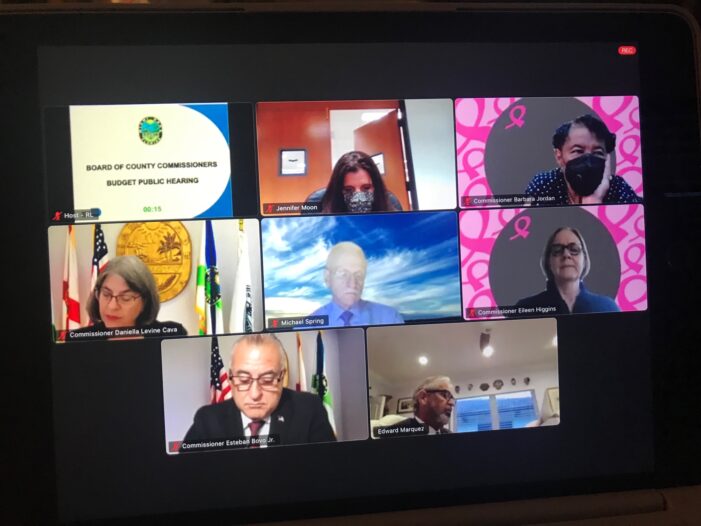One by one, the mostly young, engaged activists who spoke before the Miami-Dade Commission at the first virtual public hearing on the county’s $9 billion budget said more or less the same thing: Move 10% of the funding from the police and corrections budgets — which take up almost half of the $2.2 billion general fund — to social and community services that provide affordable housing, mental health and human services, education and alternatives to incarceration.
Yes, they were obviously given talking points and seemingly educated about the subject, likely by some of the non-profit groups that have been engaged in this election for weeks and whose members participated. Because they were well researched. And they all still seemed passionate and true believers on the issue. They not only came with the request to divert the funds, but with ideas of where they could go. Among them:
- $100 million in a recurring annual investment in the Miami Affordable Housing Trust
- $30 million in additional mortgage and rental assistance
- $5 million for an alternatives to incarceration task force to get people services and keep them out of jail — at $200 a day — while they await trial.
- $3 million for a “sobering center” to divert up to 1,000 annual public intoxication arrests so people get services and HIV tests as they dry out.
- $1.5 million for the public defender’s office for additional pre-trial services
- $400,000 for a violence prevention program
- $250,000 for a community ID program
And one by one, commissioners ignored and dismissed them, first by eating, talking on the phone and getting up from their seats during public comments. Que falta de respeto! This is your job, people. Then by discarding their requests almost six hours later with their “I know better” attitudes.

Mayor Carlos Gimenez even berated these people, some of whom waited almost three hours to speak, to exercise their right and participate in the government budget process. He barked back, angrily, like he was personally offended by their advocacy.
Read related: Miami’s first post COVID19 budget sets to hike fees in lieu of taxes
“The people who are calling are just completely misinformed,” Gimenez said, adding excuses to every wish list item (like we can’t do more? Like people don’t need more?) and complaining that speakers were scripted.
“What this tells me today is that we had an organization organizing people to come and say the same thing,” he said. “And the vast majority who did not come here are saying, ‘We are fine with your budget.'”
Okay, let’s take that same thinking process and apply it to the congressional race in District 26, shall we? If the number of registered voters that don’t vote at all and the number of people who vote for Congresswoman Debbie Mucarsel-Powell. is larger than the number of people who vote for Gimenez, the vast majority who do not vote for him are saying, “We are fine with our incumbent.”
And Gimenez is wrong anyway. Big surprise.
While there were certainly resounding elements in what the speakers said, they were all discussing the same thing and they had all researched and discussed this among themselves. Miami Herald reporter Doug Hanks said it sounded like the same talking points at a budget forum organized last month by Dream Defenders, Catalyst Miami, Engage Miami and some other activist organizations. They weren’t coached. They were educated.
And the stories were personal. You could hear emotion in the voices and one could tell some of these people lived what they were talking about.
It wasn’t totally scripted.
Donna Coker, a University of Miami law professor assists survivors of violence and studies the devastating impact of incarceration on families. She wants to see more spending on alternatives to jail and “meaningful response to trauma.”
Nobody else said that, Mr. Mayor.
Christina Bouza, an urban farmer with Grow Roots Miami, counted off a number of organic, sustainable neighborhood farms the county should help fund for “food justice and access to healthy food in food desserts.”
She was the only one who said that, Mayor Gimenez.

Felipe de Sosa said he was paying $250 less in rent than he did in New York City, but making half his old salary. He said the housing crisis was an old problem that was only going to get worse because of the pandemic. “Why are you not moving mountains developing a rent relief program to prevent renters from drowning next year,” de Sosa said.
Nobody else said that, Mr. Mayor.
Attorney Maya Ragsdale talked about a client who had been jailed several times in a short period. He’d be released, end up homeless, struggle with addiction and get locked up again. An endless cycle. “Jails are full of people waiting for trials. One third have been waiting for about a year,” she said. “During this time, people lose everything and when they get out, they have nothing.”
Nobody else said that, Mayor Gimenez.
Another speaker said she watched bond hearings and saw where a homeless man was given a $2,000 bail for stealing underwear.
Nobody else said that, Mayor Gimenez.
Mahlia Lindquist, a Coral Gables resident and former county prosecutor, isexecutive director of LEAP (Ladies Empowerment and Action Program), which operates the Dragonfly Thrift Boutique that employs women out of prison and helps them obtain housing, jobs and food. With access to these resources, women not only stay out of jail, but are able to thrive.
Nobody else said that either, Mayor Gimenez.
Andrea Nodal, a Cuban American who lives in Hialeah — the part that is Commissioner Rebeca Sosa‘s district — refuted the argument made by Sosa and Commissioner Esteban Bovo, whose district 13 covers the other part of Hialeah, that their constituents do not support reassigning police funds to these programs. “I, along with my Cuban American parents, are members of your community,” she told them.
Nobody else said that, Mr. Mayor.
Rachel Prestipino spoke about losing her 19-year-old nephew and wanting to keep his murderer in jail. “But over-policing and mass incarceration is not making us safer,” she said.
Nobody else had a story like hers.

Jessica Gutierrez Castillo talked about a man who lost his job and had been homeless for two months during the pandemic. In seven days, she got him housing and services. “It should not be the responsibility of a 26-year-old. It should be the responsibility of our government.”
Nobody else said that, Mayor Gimenez.
“Criminalizing the homeless is not public safety,” Gutierrez admonished, and now Ladra remembers why Gimenez was so cranky: Many of the speakers took issue with his little public safety speech opening the budget hearing. They stressed to him that housing security, food security and access to mental health services were also public safety.
These were personal stories. These people are invested in their community. Aren’t they exactly the kind of engaged citizen you want participating in the process, Mr. Mayor? For you to berate them and diminish their powerful testimony is not only rude, but unbecoming of an elected official. For you to put more value on the unspoken opinion of who knows how many others who weren’t there is not only silly but dangerous to democracy.
Read related: Miami-Dade’s Carlos Gimenez hoards COVID-19 CARES money, irks cities
Gimenez raved and ranted about the CARES act taking care of the rental and mortgage assistance, an existing jobs training program, $4 billion that goes to Jackson Health — “one of the leading public hospitals” — $250 million in affordable housing (read: gifts to developer friends). Like we were already doing great and couldn’t do better in any of those arenas.
He raged like Donald Trump against cities run by Democratic mayors and called San Francisco “a disaster.” He praised the Miami-Dade Police department and said they are saving lives with their Facebook stalking unit. “And many of those lives are in the black and brown communities.
“That’s why we’re not Chicago. I’m very proud of that and I hope the next mayor is proud that we’re not Chicago,” Gimenez said. “The vast majority of people in this county do not want us to defund the police. I gotta get that off my chest. We are the people elected by the people of Miami-Dade County.”
Wouldn’t that include the people who spoke Thursday, who you disrespected and ignored? Or is it only those who don’t participate?
Meanwhile, nobody talked about all the fee increases in lieu of tax increases that the county is imposing on everybody in this budget. Or the fact that this leaves the next administration (and the next one after that) in a giant hole. Guess we’ll leave that for the second public hearing on Sept. 17.
Or will that be another exercise in futility?

